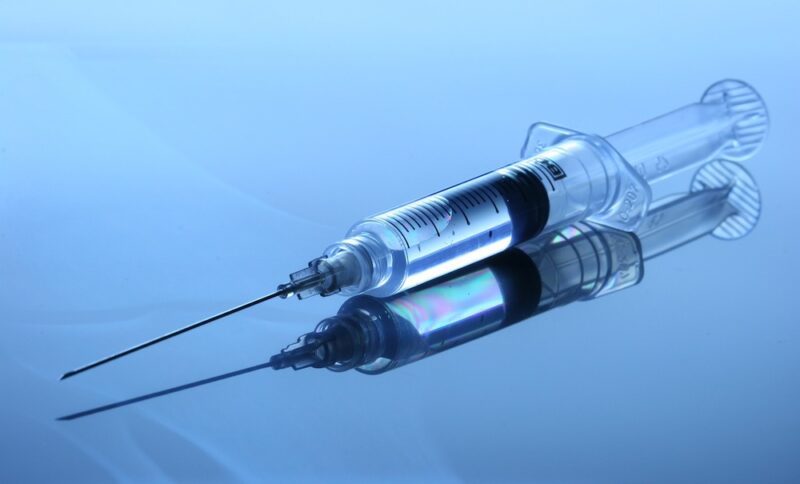

Veterinary Review Initiative
This resource has been reviewed for accuracy and clarity by a qualified Doctor of Veterinary Medicine with farmed animalA species or specific breed of animal that is raised by humans for the use of their bodies or what comes from their bodies. sanctuary experience as of October 2024.
Check out more information on our Veterinary Review Initiative here!
A Note For Readers From Outside Of The US
Whenever possible, we strive to create resources that can serve the global sanctuary community, but some topics require a more specific focus. While folks caring for pigs outside the US can still gain valuable information from this resource, we do want to point out that it is focused on vaccine recommendations in the US. Because disease risk can vary by geographical location, and vaccine availability and regulations differ from country to country, some of the information below may not apply to pigs outside the US.
Vaccines can play an important role in helping to keep residents healthy, but it’s important to work with your veterinarian to establish the most appropriate vaccine protocols based on the specifics of your resident population and your region. You can read a bit more about working with your veterinarian to establish a vaccination program for your residents here. There is no standard, one-size-fits-all vaccination program for pigs. Instead, your veterinarian will consider your residents’ risk of disease, the consequences of disease, and the safety and efficacy of available vaccines. Because sanctuary residents should not breed, commonly used vaccines that protect against certain reproductive diseases may not be necessary for sanctuary residents. Your veterinarian will be best able to advise you.
In addition to consulting with your veterinarian regarding which diseases you should vaccinate against, also be sure to consult with them regarding which specific products to use. Monovalent vaccines offer protection against a single pathogen/disease, while combination products offer protection against multiple pathogens/diseases. In some cases, both monovalent and combination products may be available, in which case, you should follow your veterinarian’s recommendations regarding what is most appropriate.
While severe adverse reactions are rare, individuals may show signs of lethargy, inappetence, and a slightly elevated body temperature 12-24 hours after vaccination. The risk of adverse reactions appears to be higher with larger dose volumes, so your veterinarian may recommend products that have a lower dose volume (for example, opting for a product that requires the administration of 2cc doses rather than 5cc). While higher dose volumes can increase the risk of adverse effects, it’s important to always follow the label instructions. Administering a lower-than-recommended dose may reduce efficacy.
A Quick Note On Dosing
Because of the significant size difference between mini pigThe term “mini pig” is used to categorize smaller breeds of pigs, such as Potbellies, Julianas, and Kunekunes, and to differentiate between these breeds and large breed pigs, such as Yorkshires, Landrace, or Hampshires, who are sometimes referred to as “farm pigs”. The descriptor “mini” can be a bit misleading- some breeds of mini pigs can weigh over 200 pounds! Terms like “teacup”, “micro”, “pocket”, “nano”, and “micro mini” are deceptive terms that are sometimes used to intentionally mislead people into thinking an individual pig will remain a certain size. breeds and large breedDomesticated animal breeds that have been selectively bred by humans to grow as large as possible, as quickly as possible, to the detriment of their health. pigs, caregivers may wonder if smaller individuals require smaller doses than larger pigs. The answer is that they do not. While you may need to wait for a very young piglet to reach a certain age before they receive certain vaccinations (following label instructions or your veterinarian’s recommendations), everyone who is eligible for vaccination will receive the same dose as other members of their species regardless of their weight.
Be sure to follow label instructions (or your veterinarian’s recommendations) regarding any age restrictions, the frequency of boosters, and how to reduce the risk of adverse side effects. In some cases, your veterinarian may recommend pre-medicating with diphenhydramine (Benadryl) or administering a non-steroidal anti-inflammatory drug (NSAID) after the vaccine is administered to help mitigate adverse effects. Your veterinarian can also offer guidance regarding whether or not multiple products can be administered on the same day or if they should be spaced out.
Ongoing Communication Is Key!
Once you establish vaccination protocols in consultation with your veterinarian, be aware that they may recommend delaying or avoiding certain vaccines in pigs who are ill. Be sure to check in with them for specific guidance.
Below, we’ll discuss some of the vaccines that tend to come up most often when caring for pigs in sanctuary spaces, but you should defer to your veterinarian for specific recommendations for your pig residents. They may strongly recommend other vaccines that are not listed here based on the diseases that are prevalent in your area, and they may have different recommendations for young piglets to offer them additional protection.
Rabies
Currently, there is not a rabies vaccine licensed for use in pigs. However, both small and large animal rabies vaccines have been used extra-labelExtra-label use means that a drug is used in a way other than what is described on the label or package insert. If a drug is used in a different species than what it has been approved for, this is extra-label use. Other examples include using a drug to treat a different condition than it is approved for or administering it in a different way than the directions describe. Extra-label drug use can only occur within the confines of a valid veterinarian-client-patient relationship. for pigs, with boosters administered annually. In many states, only a licensed veterinarian can administer rabies vaccines. While the vaccine has not been proven to be effective in pigs, according to Dr. Kristie Mozzachio, DVMDoctor of Veterinary Medicine, an academic degree awarded to veterinarians in many countries., CVA, DACVP, titers performed in vaccinated pigs support the presumption that the vaccine is effective. While the evidence suggests efficacy, vaccinated pigs may still be considered “unvaccinated” by officials. If one of your pig residents bites a human or is bitten by a wild animal, local officials may or may not take the fact that they have received the rabies vaccine into consideration when making quarantineThe policy or space in which an individual is separately housed away from others as a preventative measure to protect other residents from potentially contagious health conditions, such as in the case of new residents or residents who may have been exposed to certain diseases. decisions.
Proper record keeping is an integral part of your vaccination program, but this is particularly true with rabies vaccinations. If you need to demonstrate that the individual has been vaccinated, you want to make sure you have all the information you need to do so. In addition to recording the date the vaccine was administered, be sure to also record the vaccine brand and serial number. If your veterinarian administered the vaccine, ask them for documentation to include in your records.
Erysipelas
Erysipelas is caused by Erysipelothrix rhusiopathiae, a ubiquitous bacteria that is carried by an estimated 50% of pigs raised in intensive commercial agricultural settings. Pigs can remain healthy carriers and never develop clinical signs of disease, but these asymptomatic carriers can spread the disease in their feces and secretions from their mouth and nose. While vaccination is effective in preventing acute disease, it may not be as effective in preventing chronic disease. Both inactivated and attenuated live vaccines are available, but using the live vaccine can cause pigs to become sick and develop signs of chronic disease. Combination products are available that offer protection against erysipelas and other diseases. If you vaccinate your pig residents against erysipelas, be sure to talk to your veterinarian about how often they should be revaccinated (typically annually or biannually).
Leptospirosis
Leptospirosis is a contagious disease caused by a group of bacteria called Leptospira. Pigs, as well as most other mammals, including humans, can be affected by leptospirosis. In agricultural settings, vaccination is focused on preventing reproductive issues associated with chronic leptospirosis (e.g., abortion, stillbirths, and premature piglets). While these issues are not a concern in sanctuary spaces where residents are not allowed to breed, your veterinarian may still recommend vaccination, especially in areas where Leptopiria are endemic. Because there are multiple serovars (strains) that can cause disease in pigs and immunity is serovar-specific, it’s important to work with your veterinarian to choose a product that offers protection against the serovars of concern in your region. Multivalent vaccines are available that offer protection against multiple serovars, and combination products are also available that offer protection against additional diseases. Following the initial vaccine and booster, individuals should be revaccinated on an annual or semiannual basis. According to anecdotal information from Dr. Kristie Mozzachio, mild adverse reactions are more likely with the leptospirosis vaccine than with some other pig vaccines.
Tetanus
Tetanus is caused by the anaerobic bacteria Clostridium tetani and is most often the result of wound contamination following injury or a surgical procedure. C. tetani produces a strong neurotoxin that causes muscle spasms that increase in intensity, ultimately resulting in death. To protect your residents from this dangerous disease, your veterinarian may recommend regular vaccination with tetanus toxoid to achieve active immunization. If vaccination against tetanus is not part of your regular vaccine protocols and one of your residents is likely to have been exposed to C. tetani (or if they are going to undergo a surgical procedure that could put them at risk), your veterinarian can administer tetanus antitoxin to offer immediate, short-term protection.
Be sure to consult with your veterinarian about the most appropriate vaccination program for your pig residents. While vaccination can help minimize the risk of certain diseases, it’s important to remember that this is just one aspect of disease prevention. Biosecurity, diet, housing, cleaning practices, and veterinary care (amongst other things) also play a crucial role in keeping residents healthy!
SOURCES:
Potbellied Pig Veterinary Medicine | Dr. Kristie Mozzachio
Vaccines For Pot-Bellied Pigs | Ethos Veterinary Health
Swine Erysipelas | Merck Veterinary Manual (Non-Compassionate Source)
Leptospirosis | Iowa State University College Of Veterinary Medicine (Non-Compassionate Source)
Leptospirosis In Swine | Merck Veterinary Manual (Non-Compassionate Source)
Tetanus In Animals | Merck Veterinary Manual (Non-Compassionate Source)
Non-Compassionate Source?
If a source includes the (Non-Compassionate Source) tag, it means that we do not endorse that particular source’s views about animals, even if some of their insights are valuable from a care perspective. See a more detailed explanation here.








